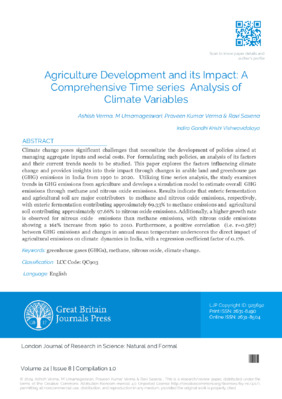Agriculture Development and its Impact: A Comprehensive Time Series Analysis of Climate Variables
Keywords:
Hemodialysis, Chronic renal failure, protein-energy malnutrition, dietary habits., Information., Energy, matter, Origin of the Universe, Spirit, Body, Computer and Software, Software Programming, relativity., Fundamental Nature of the Universe, Zero-dimensional Space, Scientific Philosophy and Reflection, Ancestral Teachings, Force and Time, Space and Existence, Fundamental Force and Thermodynamics ? Scientific Philosophy, Climate Change, methane, nitrous oxide., Greenhouse gases (GHGs)Abstract
Climate change poses significant challenges that necessitate the development of policies aimed at managing aggregate inputs and social costs. For formulating such policies, an analysis of its factors and their current trends needs to be studied. This paper explores the factors influencing climate change and provides insights into their impact through changes in arable land and greenhouse gas (GHG) emissions in India from 1990 to 2020. Utilizing time series analysis, the study examines trends in GHG emissions from agriculture and develops a simulation model to estimate overall GHG emissions through methane and nitrous oxide emissions. Results indicate that enteric fermentation and agricultural soil are major contributors to methane and nitrous oxide emissions, respectively, with enteric fermentation contributing approximately 69.33% to methane emissions and agricultural soil contributing approximately 97.66% to nitrous oxide emissions. Additionally, a higher growth rate is observed for nitrous oxide emissions than methane emissions, with nitrous oxide emissions showing a 161% increase from 1960 to 2010. Furthermore, a positive correlation (i.e. r=0.587) between GHG emissions and changes in annual mean temperature underscores the direct impact of agricultural emissions on climate dynamics in India, with a regression coefficient factor of 0.176. It is estimated that the overall GHG emission from agriculture through methane and nitrous oxide emission will be approximately 695.87 to 818.73 MMTCDE in the year 2030; while the change in annual mean temperature is estimated to be about 1.65 � 0.58o C from 1990 to 2030 in India. The findings highlight the urgent need for effective mitigation strategies within the agricultural sector to address the growing threat of climate change.
References

Downloads
Published
Issue
Section
License
Copyright (c) 2024 Authors and Global Journals Private Limited

This work is licensed under a Creative Commons Attribution 4.0 International License.





